Car air conditioners are an essential part of any vehicle, especially during the summer months. But is it possible for your car's air conditioner to make you sick? Let's take a look at how car air conditioners work and what the potential health risks are.
It's possible your car air conditioning is making you sick if there is mold buildup in the vents. Car air conditioners work by circulating the air in the car and also by evaporating any moisture in the air. Unfortunately, this can create an ideal mold environment, especially if there is food or dirt.
If you are feeling under the weather, then your car air conditioning is probably the last thing you'd expect to be the culprit. However, this article will explain how a car's air conditioning can make you sick. In addition, we will discuss how to fix the problem and answer other frequently asked questions about car air conditioners, so read on!
How Your Car Air Conditioner Can Make You Sick
Car air conditioners work by circulating the air in the car and also by evaporating any moisture in the air. This can create an ideal mold environment, especially if there is food or dirt. However, mold spores are tiny and easily inhaled, which can cause a variety of respiratory problems.
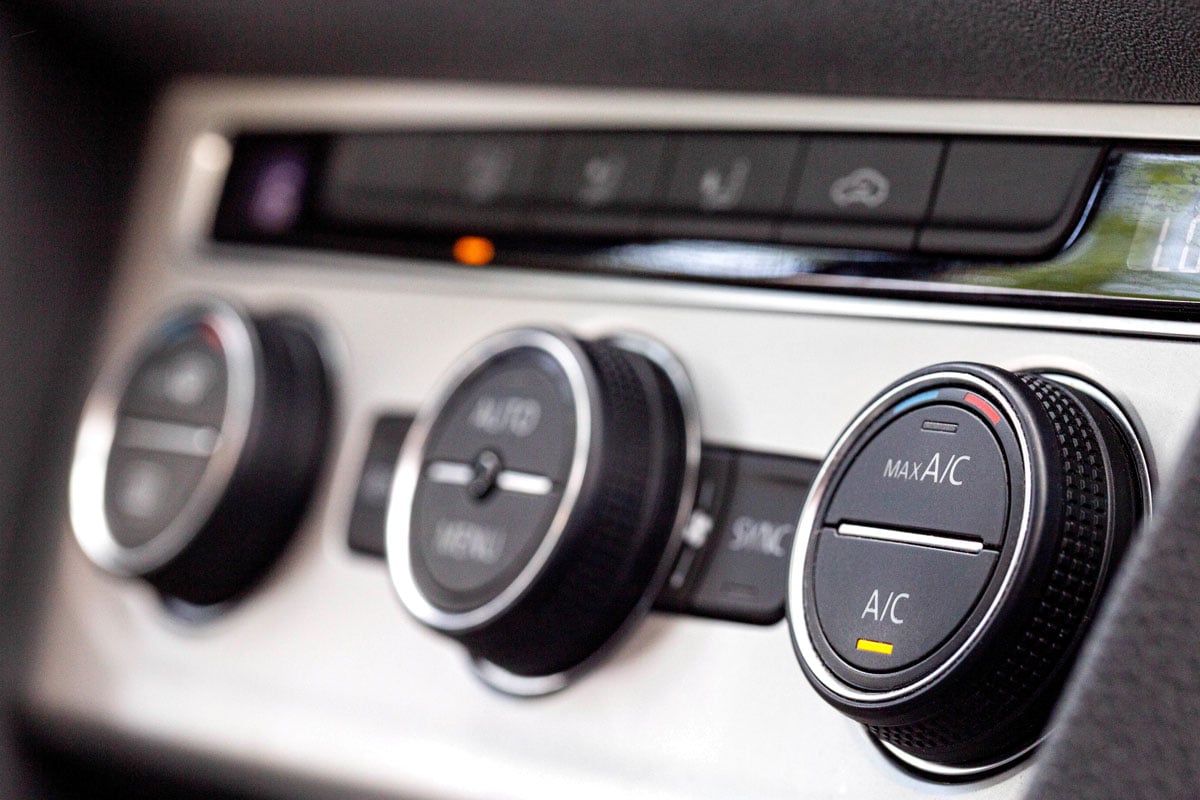
The funny thing is, you might not even know that you have a mold problem in your car's air conditioner. This is because mold can grow in hidden places and can be difficult to spot. But, if you are experiencing any of the following health problems, mold may be the cause:
- Allergies (such as sneezing, watery eyes, or a runny nose)
- Asthma
- Coughing
- Difficulty breathing
- Eye irritation
- Fatigue
- Fever
- Headaches
If you think you might have a mold problem in your car's air conditioner, the best thing to do is to have it inspected by a professional. They will be able to determine if there is a problem and recommend the best course of action.
Typically, the detailer will inspect the air conditioner, clean the vents, and apply a mold-resistant coating to prevent future growth.
You can also clean the vents yourself by buying detail spray and simply spraying the vents down. First, make sure to get in all the nooks and crannies! Then use a detail brush to scrub the vents clean.
What Are Signs Of Mold In Car A/C Vents?
A musty smell is one of the most common signs of mold in air conditioning vents. If you notice this smell, it's important to take action right away, as it likely means there is already a significant amount of mold growth.
Other signs of mold include visible mold growth on the vents themselves or other surfaces near the vents, such as the dashboard or center console. You might also see dust or dirt that looks like it's been stained.
If you notice any of these signs, it's important to have your car's air conditioner inspected by a professional as soon as possible. This is especially true if you have children or elderly passengers, as they are more susceptible to mold-related health risks.
How Do You Prevent Mold In Car A/C Vents?
One of the best ways to prevent mold in car A/C vents is by regularly cleaning the vents. This can be done with a vacuum attachment or a brush designed for cleaning air conditioner vents.
It is easy to overlook cleaning the vents because they are difficult to see. However, if you make a habit of cleaning them every few months, you can significantly reduce the risk of mold growth.
Over time, mold growth can cause serious damage to the air conditioning system. In addition, it can be extremely difficult to remove once it has taken hold. That's why it's important to be proactive and clean the vents regularly.
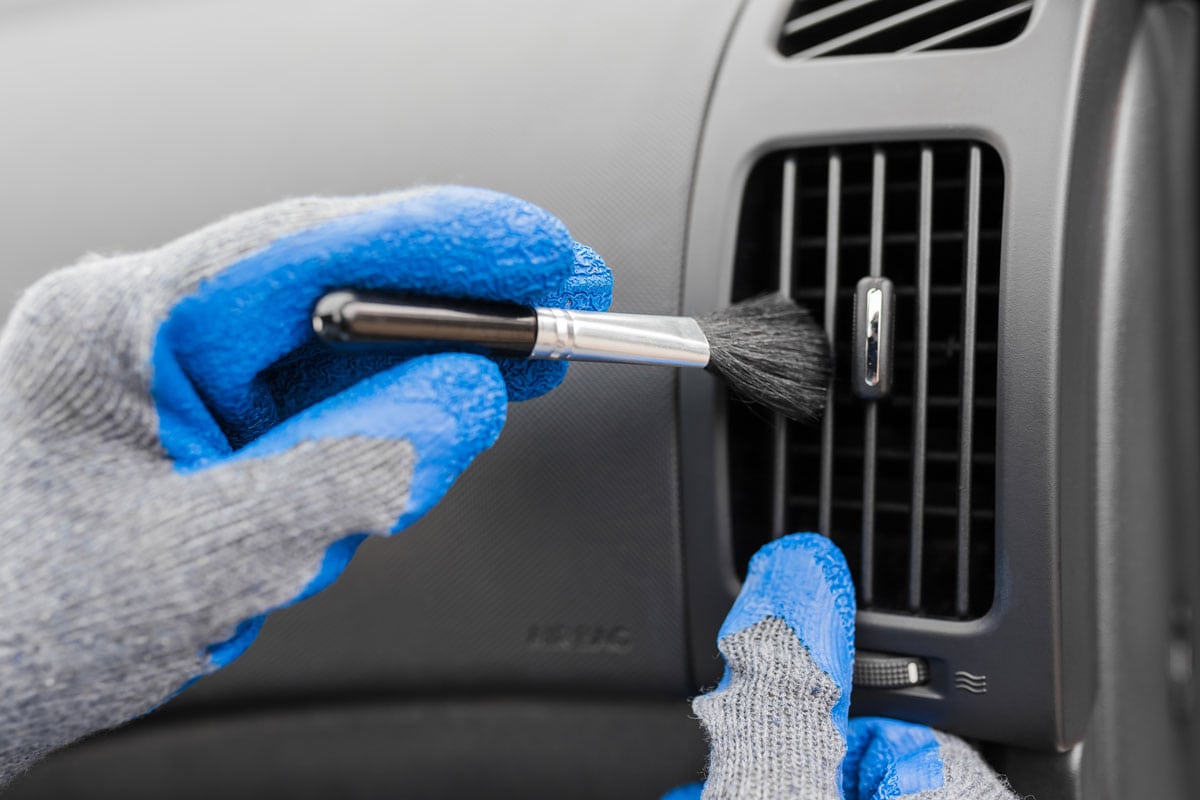
You can also use a mixture of water and vinegar to clean the vents. Simply spray the mixture on the vents and let it sit for a few minutes. Then use a brush to scrub the vents clean. Vinegar can also mitigate the risk of mold returning.
Can Mold Grow In Other Places In A Car?
Your car A/C vents aren't the only place where mold can grow. In fact, if conditions are right, mold can grow anywhere in your car.
Other places where mold is commonly found include:
- The trunk
- Under the seats
- Carpet floor mats
- In the carpeting
- On door panels
- On the headliner
Mold gives away its presence by a foul smell. So, if you notice a musty smell in your car, it's important to take action right away, as mold can cause serious damage.
Inspect your vehicle thoroughly for any signs of mold and clean the affected areas with a mixture of water and vinegar. You can also use a brush designed for cleaning air conditioner vents to scrub the area clean.
If the mold is bad enough, it's a good idea to go to a professional detailer to clean and seal it. This will help prevent the mold from returning and causing further damage to your car.
Also, talk to your kids about telling you if they spill something so you can clean it up right away and prevent mold from growing.
Should You Throw Away Carpet Floor Mats With Mold?
Carpet floor mats aren't as resistant to mold as other materials, so it's important to take action as soon as you notice any signs of mold.
If the mats are heavily affected by mold, then it's best to throw them away and replace them. However, if the mold is only on one side of the mat, then you can try cleaning it with a mixture of water and vinegar.
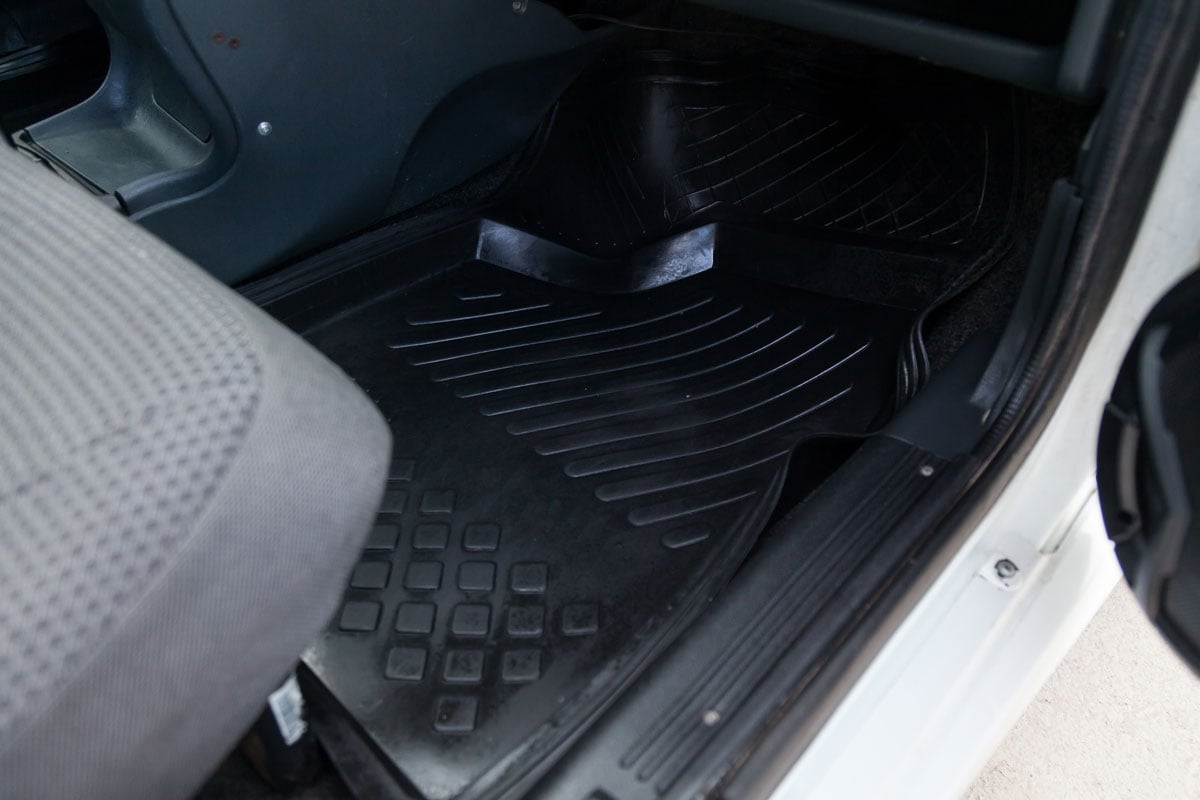
If you need to throw away the mats, then make sure to clean the area where the mats are. This will help prevent the mold from spreading.
In addition, investing in good-quality rubber mats can help prevent mold growth. Rubber mats are easier to clean and don't provide the same environment that mold needs to grow.
How Much Is It To Detail A Car With Mold?
Depending on the severity of the mold growth, it can cost anywhere from $50-$300 to detail a car with mold. The price will vary depending on the size of the car and the extent of the mold growth. If you have a lot of mold, it will take more time to clean and be more expensive.
In addition, even if the mold is only in one spot, you should have the entire car detailed to prevent the mold from spreading.
While it will cost you more, having your car detailed is the best way to remove mold and prevent it from coming back.
How Fast Can Mold Grow In A Car?
In the right conditions, mold can grow extremely quickly. In fact, some types of mold can grow within 12-24 hours. That's why keeping your car dry and clean is so important. When you see mold, get your car into direct sunlight as soon as possible to help dry it out. The longer you wait, the more time mold has to grow and spread.
Should You Leave Your Windows Cracked To Prevent Mold?
Cracking your window or sunroof may seem like a good idea to let air circulate and prevent mold from growing. However, this can actually make the problem worse.
When you leave your windows cracked, it provides the perfect environment for mold to grow. In addition, the moist air from outside will condense on the cold surfaces inside your car, and this will lead to mold growth.
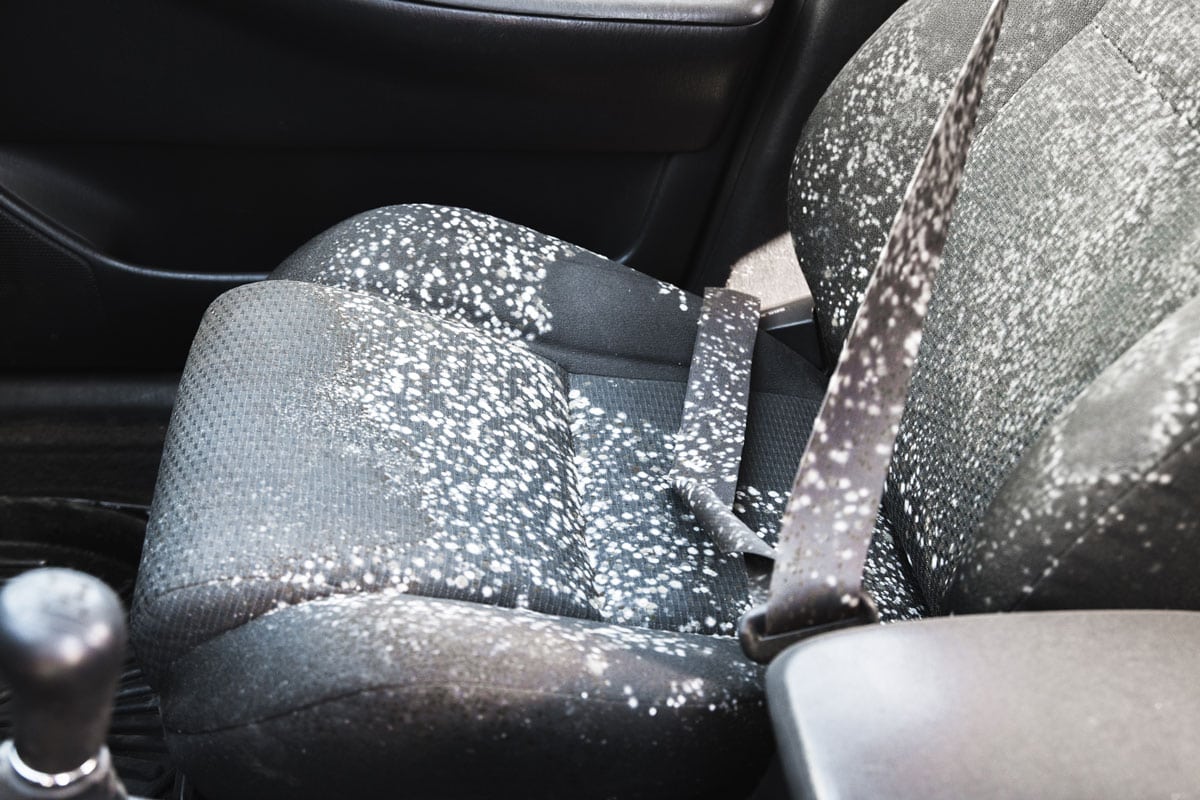
In addition, any rain or snow that gets into your car will also lead to mold growth. So, it's best to keep your windows and sunroof closed to prevent mold from growing.
Sunroofs can also have a sealant that can crack and let in water over time. If you think your sunroof may cause mold growth, it's best to have it repaired or replaced.
However, if mold is already present, then you need to ventilate the car. By doing so, the mold spores will escape, mitigating the risk of the mold spreading.
Final Thoughts
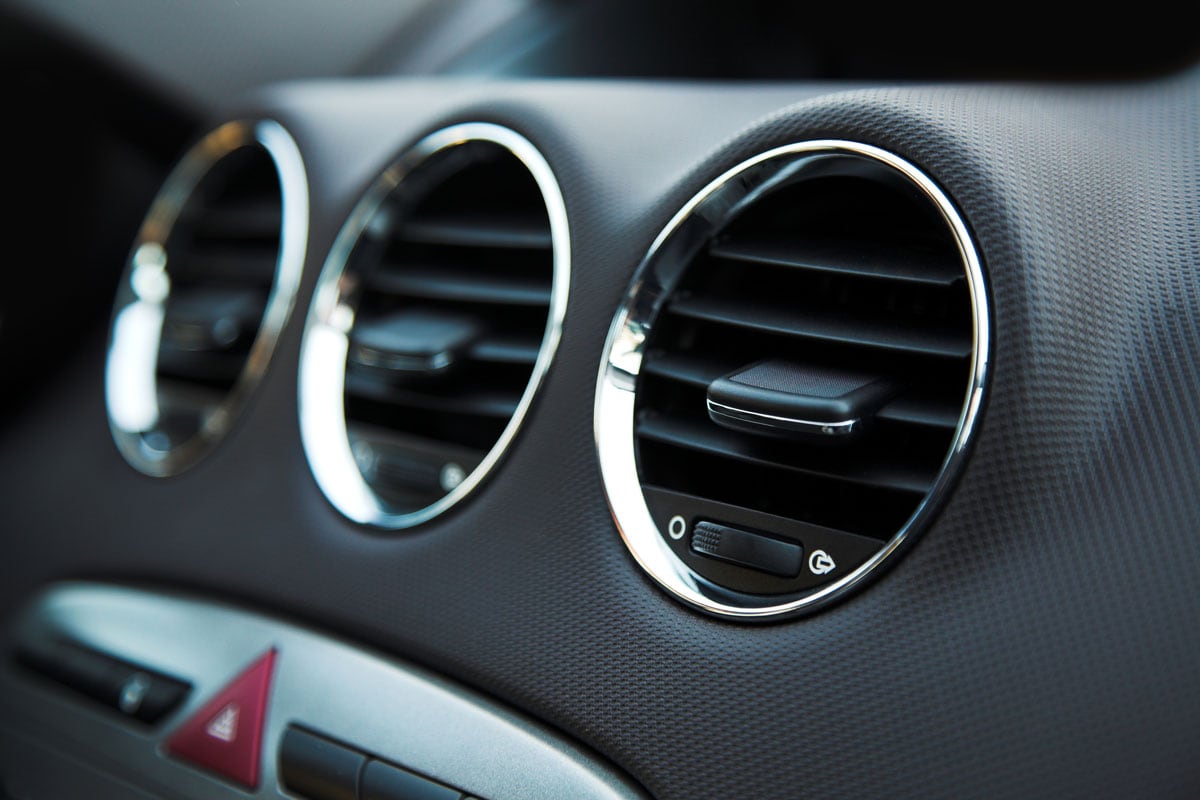
Mold is a bad thing for your car and your health. If you see mold, take action immediately to clean it up. Investing in good-quality mats and keeping your car clean and dry will also help prevent mold from growing. And, if you have a sunroof, ensure it's in good condition to prevent water from entering your car.
Made it to the end? Here are other articles you might find helpful:

